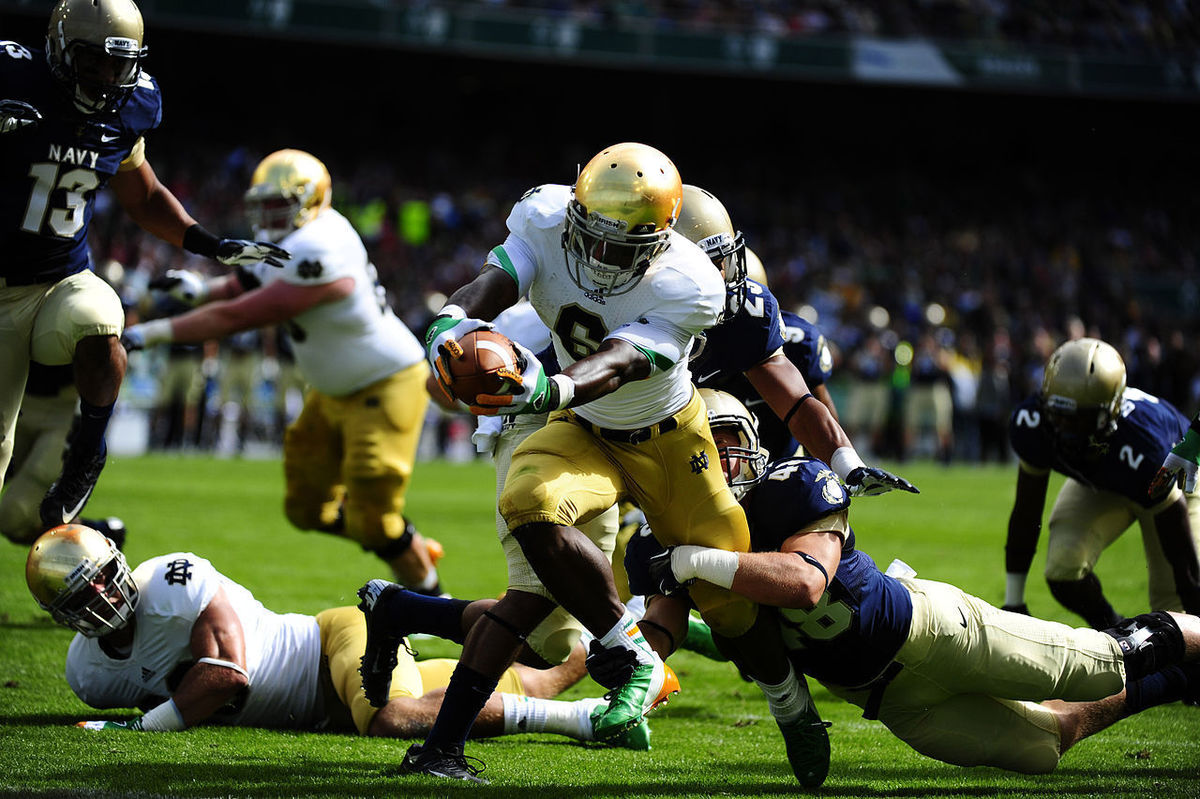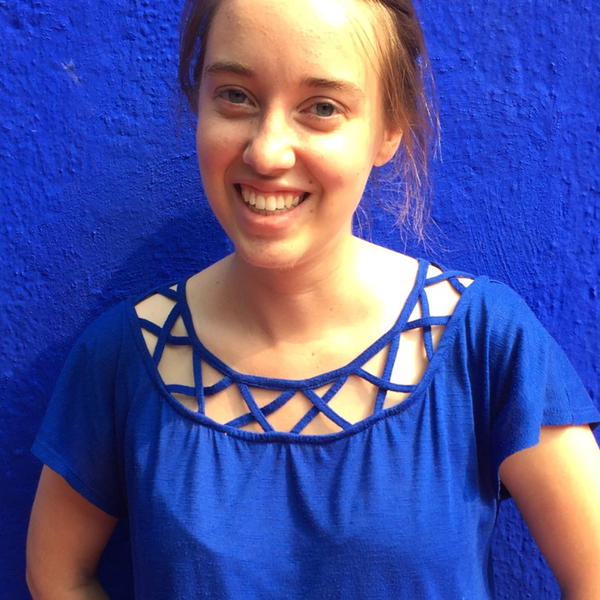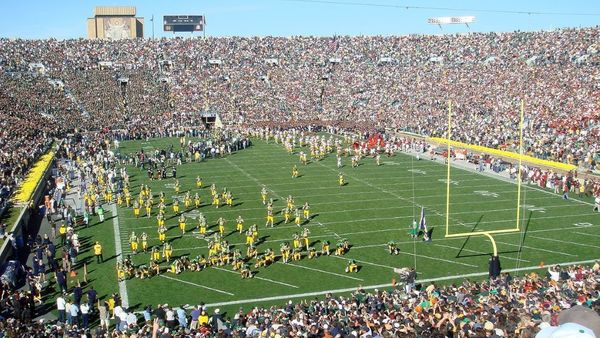For half a dozen Saturdays every fall, the University crafts a magnificent story. The Notre Dame Football Weekend for many Irish fans means a break from work, plenty of food, time spent with family and friends and the pleasant exhaustion that accompanies hand-clapping, hoarse-yelling, heart-twisting victories. It’s a sensational event. It’s a well-developed story. But there are others who tell the story differently.
“Experience the call to greatness.” An advertisement for premium seating at Campus Crossroads offers insight into an elevated gameday experience—literally.[1] Extending from the upper floors of the Duncan Student Center and Corbett Family Hall, these seats look down over the field and stadium bowl. Duncan and Corbett are two of three buildings in the Campus Crossroads Project, which made its debut this year—the product of more than $400 million dollars and 3 million hours of labor. Each with nine successively impressive floors, these building tower over much of campus[2] and provide classroom, study, recreation, and rehearsal space. The project was funded in part by the sale of premium club seats; those who commit to purchasing tickets for a certain number of years have access to an all-inclusive gameday viewing experience in the upper level club space.
Ryan, a senior working for the Office of Development at Duncan Student Center, provided a glimpse into the gameday environment out on the terrace. For those in the steepest-priced seats, the highest level of experience currently available for purchase, one iPad is provided for every two seats. These allow a select group of ticketholders to watch the Notre Dame game and other football games and to order food and drink. Ryan’s job, primarily, is aid ticketholders if their iPad malfunctions—he troubleshoots glitches in the gameday experience. Ryan shuts down and restarts the device, which is fairly effective for restoring functioning.
Meanwhile, waiters stand right inside the door, receiving food orders to their own devices. They collect the food from staging tables and run them to the ticketholders. Those with “cheaper” seats, those without iPads, need to walk inside to get their food. All food and drink is included in the price of the ticket.
Inside there are meat carving stations and walls of soft pretzels. Tables are laden with never-empty fruit trays. There are Kalamata olives and varieties of salsas, rows upon rows of popcorn boxes. An open bar in the corner offers craft beers and wines to those of age. If anyone wants ice cream, they can’t get it until the 3rd quarter.
I recently had the chance to sit down with Joe and Brian from premium sales and marketing. Premium seating, they say, is a phenomenal experience.
Joe and Brian assure me that despite the spatial barrier between the premium terrace and general seating which lay below, ticketholders are actively involved in the game experience. Open-air seats provide access to the sounds and sights and energy of gameday. Although they have a great field viewing angle, high-priority ticketholders can relive plays on their iPads if they miss the action while ordering food or looking up a concurrent game. They are even protected from the elements—a heating system raises the temperature around these seats when it drops below 50 degrees.
Hospitality staff told me, with playful worry, “it’s such an amazing experience—no one will want to go back into the stadium bowl!”
The main reason the elevated experience is so amazing, say Joe and Brian, is that all the traditional elements of gameday are maintained, but better. If premium seats operate as they’re designed, ticketholders will recognize the Notre Dame gameday experience they have come to love but with a better view, better conversation, better food. Even far above, in the stately terrace seats, ticketholders can observe every touchdown, every Hail Mary pass, every push up, all while sipping their craft beer.
For those with access, Hospitality promises a gameday experience that has been enhanced, “elevated to a new level of tradition.” It’s the ultimate upgrade.
Or as Joes tells me, “You’re not sacrificing anything any longer.”
"You want stories? I could tell you all kinds of stories. You want good ones, or, horror ones." Melanie laughs as she peels off her gloves and shouts a “See you later” to her coworker. This vibrant, blonde ball-of-energy woman leads me to the breakroom so we can sit and talk. She’s sporting perfect nail polish, dark blue accented with a gold ND monogram on each hand.
“Well, I used to work on gamedays but I had to stop,” Melanie tells me. She’s a single mom with two young kids and Saturdays are for them. While weekdays are filled with school and long shifts at the residence hall where she works as a housekeeper, Saturdays Melanie dedicates to her kids. She calls it “their time.” This fall, she had to break from that tradition by working in the premium seating area on gameday. While she was away for all-day shifts in the stadium, her kids began to miss their mom. So she gave up an extra day of income to be at home with her family.
Spending time with her children wasn’t something she was willing to sacrifice.
Before quitting, she worked four games at Corbett Family Hall. Four Saturdays of “their time.” Everyone’s real nice, she says, but she’s not supposed to be seen.
She would arrive 2 hours before the game and stay 2-3 hours after. Every moment was busy, chaotic. The main thing was the trash. Before people arrive, she and her coworkers lined each trash can with at least 5 bags each. They had to pull bags frequently, constantly replacing bags. They prepared trash carts and when a trash cart overflowed they would take the cart downstairs to be driven away from the upstairs scene. Then they would bring it back upstairs, empty, ready for a new round of waste.
Guests arrived and her team would scatter. They got the trash out of the way. They stayed out of the way.
Of course, there were other duties to juggle. Melanie tells me that one of her responsibilities was to maintain the safety of the guests, including alcohol safety. She watched for anyone who seemed to be over-enjoying the open bar, ready to intervene if they looked like they might get sick. Guests were to be relieved of all their worries.
Around kick-off, the guests would venture outside to enjoy their elevated tradition (amenities). But Melanie’s job was just beginning. The bathroom needed constant tending. “You might clean the whole thing,” one worker tells me, “and then come back 15 minutes later and it’s all . . . you know, 40 people have used it.” Melanie and other Building Service workers would move throughout floor, clearing messes, cleaning spills, and restocking the bathroom. At half-time, guests returned indoors, leaving another “huge mess.”
More trash bags needed to be removed and replaced. More trash carts needed to be loaded and brought downstairs. The loop continued throughout the day, continually descending and ascending. There was no room for waste in the enhanced gameday experience, and so it fell below—unseen and unnoticed.
All the while, two kids waited at home, missing their mom.
These are not the dominant stories. They are not often told or not often listened to.
But Mary, Our Mother, collects these stories with as much care as the better rehearsed ones. She hears all our stories. They are lined up, kneeling, eye level with her. She reads them all, each one, every page.
And she sees the tradition alongside the sacrifice.
[1] “The Notre Dame Stadium experience is being elevated.“ http://premiumseating.nd.edu/
[2] For those who may be tempted to refer to the buildings’ stature as “over-sized,” the official Crossroads Frequently Asked Questions page reminds them that Fr. Ted Hesburgh Library was once called “Ted’s Mahal”. (Crossroads, too, must be destined for greatness.) https://crossroads.nd.edu/about-the-project/faqs/


